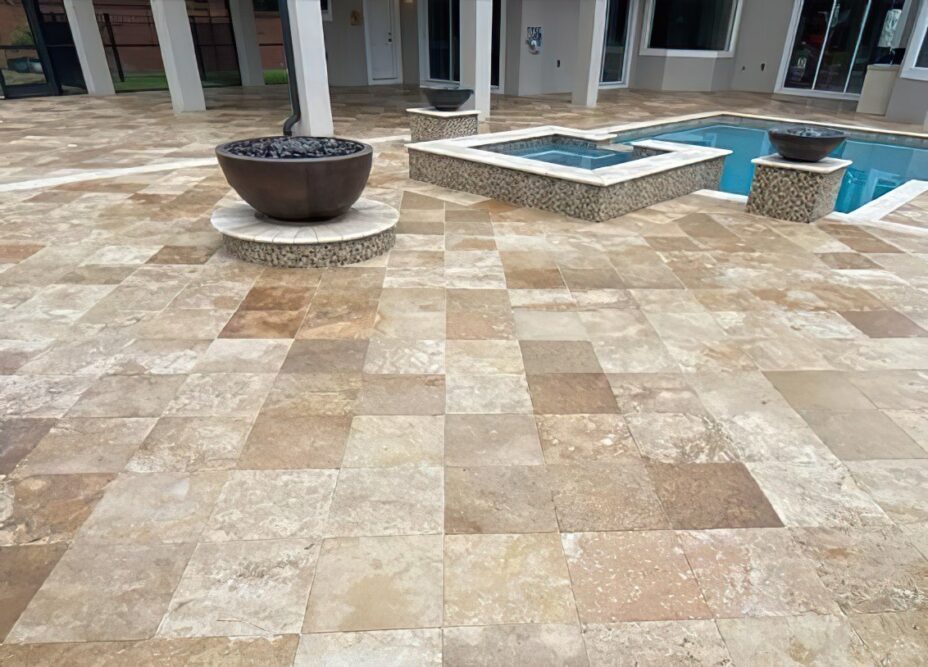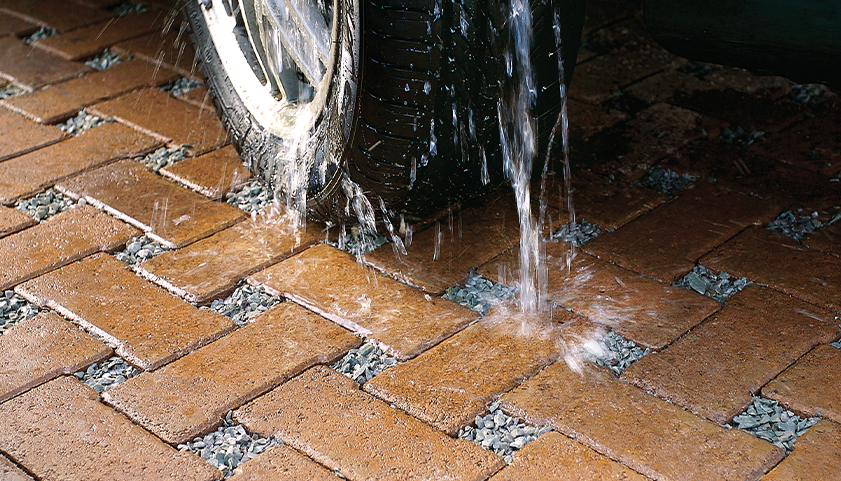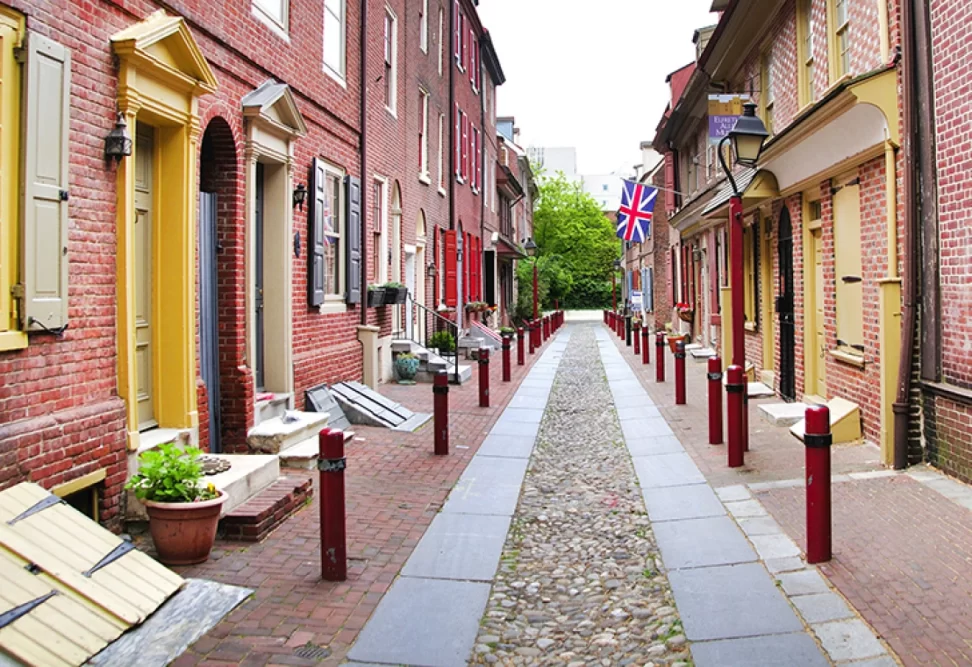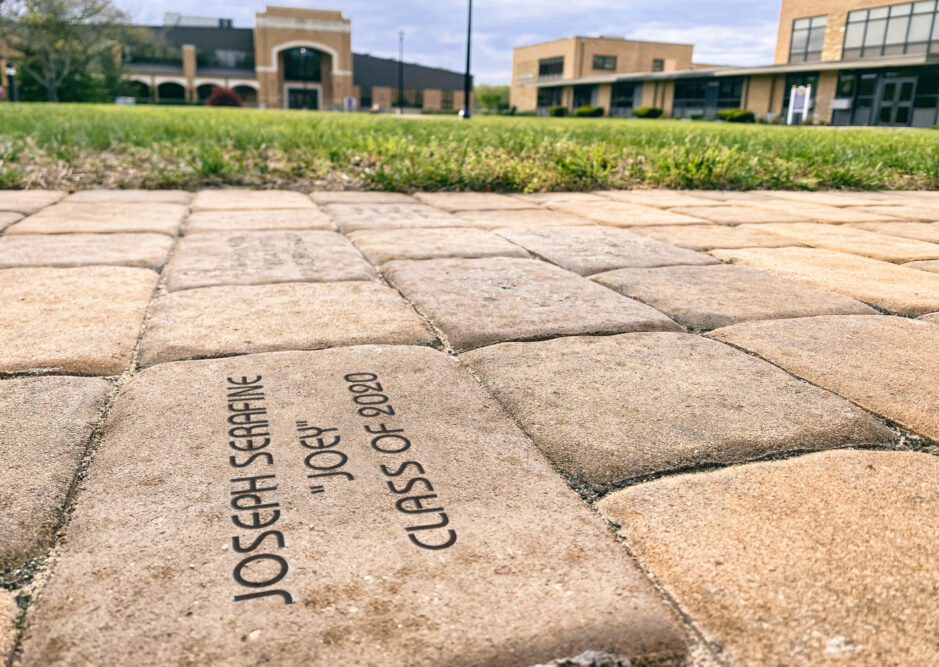Travertine pavers can transform your patio, pool, or pathways into works of architectural art. If that appeals to you, check below for ten qualities of travertine that make this beautiful stone a perennial favorite.
Travertine is a natural stone formed from limestone deposits. It is often found near hot springs and geysers, where mineral-rich water flows and causes the limestone to dissolve and then re-form.
The resulting stone has a unique appearance with an endless number of patterns, textured with natural pits, holes, and ridges that give it a distinctive character.
Travertine Qualities
- Travertine Never Goes Out of Style
- Travertine Colors are Classic and Varied
- Travertine is Naturally Slip-resistant
- Travertine is Cool to the Touch
- Travertine is Durable
- Travertine Handles Changing Weather Conditions
- Travertine Resists Fading from UV Light
- You Can Replace Individual Tiles
- It’s More Affordable than Marble or Granite
- Travertine is Environmentally-friendly
1. Travertine Never Goes Out of Style
For centuries travertine has been an elegant solution with its natural colors and unique veins complementing a wide variety of architectural styles. So when you update your landscaping or refurnish your patio in the future, the travertine pavers will still look great!
2. Travertine Colors are Classic and Varied
Travertine is a natural stone that Mother Nature produces. It comes in a wide range of hues from neutral colors like cream and tan to more striking colors like blue and gold. Travertine pavers’ wide variety of colors, textures, and shapes allow you to create truly unique designs for your residential or commercial project.
3. Travertine is Naturally Slip-resistant
Travertine has a relatively porous, non-slip surface with a rustic textured finish. Travertine’s porosity — its permeability — allows water to be absorbed into the tile rather than beading on the surface. This absorption also prevents puddling after heavy rains. This makes travertine a safe choice for pool decks and other uncovered outdoor areas.
Pro Tip: Polished travertine tiles are filled with epoxy and polished — they are slippery so save for interior projects.
4. Travertine is Cool to the Touch
Travertine’s porosity also acts as an air conduit, moving the cooler air underneath the paver up while reflecting the sun’s rays. The moving cool air repels heat. This keeps the surface cool to the touch. Even under the midday sun, there’s no risk of scalded feet.
Pro Tip: Cool paver surfaces are an important quality for residences with pets and public parks and pools.
5. Travertine is Durable
Travertine has an extremely hard and wear-resistant surface. That means it’s a great choice for outdoor areas with heavy foot traffic. Travertine can, quite literally, last a lifetime, even over 100 years. This means that paving hardscape areas with travertine is a one-and-done solution.
6. Travertine Handles Changing Weather Conditions
Travertine is formed from calcium carbonate that is very stable in changing temperatures — even in frequent freeze/thaw cycles — so travertine is a good choice.
Pro Tip: To maximize travertine’s stability in locations with freeze/thaw cycles install 2″ thick tiles. Warmer locations can install 1-1/4″ tiles.
7. Travertine Resists Fading from UV Light
Like most natural stone, travertine pavers will not fade — even when always in the full sun. So no matter their location in your hardscape, you know they’ll look the same over the years ahead.
8. You Can Replace Individual Tiles
If an individual paver gets damaged by something heavy falling on it or an acid spill, it’s not too difficult to pull up and replace just the damaged tiles.
Pro Tip: Since travertine has such unique colors and patterns buy extra pavers so replacement pavers will match.
9. It’s More Affordable than Marble or Granite
Travertine gives you a look that’s comparable to marble and granite but without their hefty price tag. Travertine is less expensive than granite, marble, and slate. So with travertine, you can save some money and still enjoy beautiful natural patterns with unique textures.
Pro Tip: Travertine is a porous stone. It’s best to seal it with a natural stone sealer and clean regularly with a gentle, non-acidic cleaner.
10. Travertine is Environmentally-friendly
Producing manmade concrete or plastic paver products involves working with dangerous chemicals and manufacturing processes. Travertine is a natural stone product, so there are fewer harmful chemicals involved in the process of getting it from the quarry to your project.
Your First Choice
Choosing what type of paver to use for a residential or commercial hardscape project is often the first — and most important — project decision. Travertine combines classic beauty with eco-friendly safety and easy maintenance for your patio, pool deck, path, and entryway projects. Travertine is an excellent choice for many projects.




